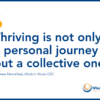I talk with leaders and organizations every day about how important wellbeing is to building a culture where employees and companies can thrive. I’ve seen no better example of a wellbeing leader in action than this week’s Face of Wellbeing Leadership Todd Walter. His story of how an upside-down org chart turned business—and wellbeing—around at Red Door Spa is so compelling and a lesson to us all. Red Door is a day spa experience with 29 locations in the USA operating under the Elizabeth Arden Red Door Spa brand. Under Todd’s wellbeing leadership, the company’s mission of “maximizing profit” evolved into a true vision to “enhance the lives of our guests and associates through beauty, harmony, and wellbeing.” I spoke to him recently about the benefits of embracing wellbeing.
Putting Wellness & Stress Reduction First
“The spa industry is unique in that every moment with a customer is a direct opportunity to facilitate wellness. And, like healthcare, a lot of people who are passionate about healing are attracted to work in our industry. Yet we noticed lots of signs of overstress from associates providing so much caregiving to others, but not always taking care of themselves,” Todd says.
That’s why when he became CEO in 2006 he decided to develop a vision that would better reflect how Red Door’s 2,000 associates wanted to lead their lives. The new vision put guests and associates at the top of the org chart with wellness and stress reduction as priority goals. “This approach fit well with the beginning of Elizabeth Arden as a company,” Todd says. “Elizabeth Arden herself always believed that for every woman to look beautiful on the outside she must feel beautiful on the inside. Arden understood total wellness. She knew that enhancing people’s lives could happen through boosting self esteem and stress reduction, such as through a fabulous haircut or a wonderful massage.”
Changing the Culture
Red Door began implementing a number of initiatives that helped associates feel that their company cared about their wellbeing personally:
•Better Health Insurance
“We researched the best practices for successful companies and found that they offered 80% healthcare coverage for their employees plus 50% coverage for dependents. So in 2008, we put into place a 5-year strategy to achieve that kind of coverage for associates at Red Door,” Todd says. “We’ve not only accomplished that strategy, but have found that participation by people who are healthy has increased. We’re getting more healthy people—including children—into the health plan.”
• Wellness Education
In 2009, Red Door created a system that lets associates create the wellness approach that is most meaningful to them and where they work. “We have wellness captains in our 29 locations who network into an overarching wellness committee. This system shares our wellness education (12 wellness topics covered over the course of a year) and gets input from associates about what else needs to happen to make the workplace healthier. Participation in all of it is 100% voluntary,” Todd says. The company also promotes contests—such as the 10,000 Steps program— to encourage teamwork and to help associates make lifestyle changes by motivating each other. “Our goal is to have associates drive healthier lifestyles for themselves and to make wellness a priority in their work environments.”
• Spa Services for Employees
In spite of their dedication to wellness through spa services, Red Door’s own associates weren’t using these services until Todd made at a big change. “Today an associate can get a service at no or very low cost as long as there are no guests booked for it. Usually this means a lot of bartering happens—someone gets a haircut and pays the person back with a massage—so this approach also engenders a lot of teamwork. It’s also increased our associates’ ability to be an effective ambassador of our services and our brand,” he says.
• More Giving Back Opportunities
“Our wellness platform has both an internal and external focus. It enhances associates’ lives but also helps them give back to others as part of sharing (and experiencing) wellbeing,” Todd says. Red Door supports organizations such as Dress for Success, providing makeovers to battered women, for example. “Our goal is to provide a vehicle for people to give.”
Sending the Message: U Matter
Red Door realizes that the most important factors for creating a healthy, sustainable workplace culture are the basics: personal growth, relationships, and giving back. “We believe that if our associates aren’t engaged and growing, they’ll leave our company—and that will make our business unstable,” Todd says. The company works hard to let associates know that it cares about them. It’s #1 priority for 2014 has been “U Matter!” with the tagline: HYBH (Help Yourself to Better Health). “HYBH has to start with me as the CEO as well as the leadership team,” Todd points out. To spread the message, this year’s annual leadership conference emphasized “U Matter,” Todd says. “Our associates’ wellbeing is a main priority for Red Door. Without our people, we don’t have a business!”
“Leading wellbeing means using the organization to advance wellness in a much broader way to benefit society, and leading in this way is going to be the new normal,” Todd says. “The younger generation demands it! We’re learning that putting the right vision and mission in place and bringing passionate people together around those can create a great culture—and great performance. This is when magic occurs!”
READ MORE
• How the Spa Industry Can Lead Wellbeing
• The Big Questions of Living an Inspired Life
• How Nike’s Jorge Casimiro Finds His ‘Inner Pre’
• Alexis Jones: A Millennial’s Wisdom for Leading Wellbeing
 Renee Moorefield, PhD
Renee Moorefield, PhD
A deep and early belief that the values of health and sustainability would remake the way we live, lead, and work in the 21st century led Renee to launch Wisdom Works with her husband David Moorefield in 1999. Ever since, she’s helped forward-thinking clients—including Apollo Group, Booz Allen Hamilton, Merck & Company, Centura Health, Western Union, and The Coca-Cola Company—embed wellbeing strategies to create inspired workplaces, develop caring relationships with citizens, and produce results that matter.







